Beijing rarely, if ever, fails to react to a real or perceived threat, especially from the West. At the G7 meeting in Tokyo, President Biden stated that the leaders were keen to “de-risk and diversify” their relationship with China.
The next day, the Cyberspace Administration of China (CAC) published a brief statement: “The review found that Micron’s products have serious network security risks, which pose significant security risks to China’s critical information infrastructure supply chain, affecting China’s national security.” So far, the American chip maker has been banned only from key infrastructure projects.
The latest move by China was not wholly unexpected. Back in March, President Xi had threatened to retaliate against what he termed as Washington’s efforts to “block” China’s development. The “block” he referred to was the decision by the U.S. and the E.U. to curb the transfer of advanced chip manufacturing technology and equipment to the country. Japan later joined the fray, restricting Beijing’s access to specific technology for making processor chips.
The concerted effort by the international community was primarily in response to fears sparked by China’s rapid militarization and aggression. Advanced semiconductor chips are crucial components in nuclear missile delivery systems and other weapons of modern warfare. The increasing military-civil fusion on the Chinese mainland, wherein technology and resources enjoy a quick two-way transfer between the civil society and the military establishment, has raised alarms. The Western world is trying to slow down China’s race toward becoming a military superpower to safeguard international peace and strengthen national security.
Meanwhile, with its latest move, Beijing is walking a tightrope. Despite massive investments, multiple incentives, and government initiatives, China’s chip industry is a few years behind technological advancements elsewhere.
Until domestic R&D and production catch up, China has no choice but to rely on international suppliers. While much of the world’s electronics is assembled in China, many components are shipped from abroad. Amid an economic slowdown, worsened by the disastrous Zero Covid policy, the country cannot afford to have one of its most prolific sectors stagnate.
That sentiment and economic considerations are apparent in the statement issued by the Cyberscape agency. It said, “China firmly promotes high-level opening up to the outside world and, as long as it complies with Chinese laws and regulations, welcomes enterprises and various platform products and services from various countries to enter the Chinese market.” Interestingly, Micron already has manufacturing facilities in China, and the official review was announced after Japan joined the chip tech embargo.
Though China’s decision is unlikely to significantly affect the American chip maker, the tit-for-tat measures do not bode well for the technology sector. As it is, many popular and widely used search engines, apps, and software are banned on the Chinese mainland. The latest on the list is ChatGPT, the popular discussion bot created by US-based OpenAI.
Industry experts warn that a complete decoupling and independent pursuit of technology development will cost us dear in the future. While national security and data privacy concerns remain and must be addressed, a shift to separate, walled garden technologies will make devices such as smartphones and laptops unusable in many parts of the world. Besides restricting portability and the use of electronic devices, the walled garden approach would likely slow innovation and require additional investment to duplicate an existing technology.
The tech dispute between the U.S. and China is just another facet of the strained and contentious relations between the two. In what could be interpreted as a slight thaw in relations, Beijing finally filled the post of Ambassador to the U.S. after leaving it vacant for four months. On his arrival in Washington, the newly-appointed diplomat, Xie Feng, said, “I’ve come here to enhance China-US exchanges and cooperation,” while admitting that relations between the two countries face “serious difficulties and challenges.”
Even as countries seek more diverse supply chains and fortify their manufacturing capabilities, China’s significant role in trade and commerce cannot be disregarded. As nations formulate new policies and strengthen safeguards, the tech world hopes it will not be at the cost of innovation.
Like our insights? Show your support by becoming a paid subscriber!
TIPP Picks
Must Watch/Read – Selected by tippinsights Editorial Board



TIPP Takes
Geopolitics And Geoeconomics
1. Wagner Chief Prigozhin Says Russia’s Plan To ‘Demilitarize’ Ukraine Has Failed – RFE/RL
Yevgeny Prigozhin says Moscow’s plan to “demilitarize” Ukraine with its full-scale invasion has failed, instead turning its neighbor’s army into one of the “most powerful in the world” and setting Russia up for a possible uprising.
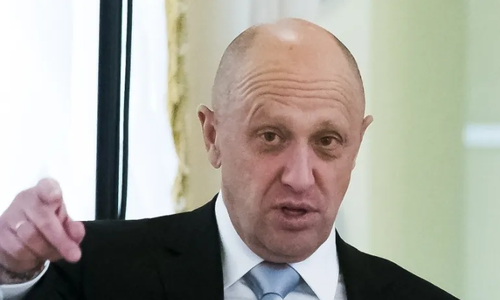
In an interview, Prigozhin recalled that when Moscow launched its invasion of Ukraine in February last year, the Kremlin called it “a special military operation to demilitarize and de-nazify Ukraine.”
2. Russia Says Warship Ivan Hurs Attacked By Ukrainian Speedboats In Black Sea – Reuters
In a statement, the Russian defense ministry said the warship had been protecting the TurkStream and Blue Stream gas pipelines, which carry gas from Russia to Turkey, partly across the Black Sea.

No comment was immediately available from Kyiv.
The Russian statement appeared likely to raise tensions in the Black Sea, where Russia only agreed last week to extend a deal allowing Ukraine to export grain safely from its seaports.
3. NATO Chief Admits Splits On Ukraine Membership Push – AFP
NATO Secretary General Jens Stoltenberg said the members of the Western military alliance are divided on what to do at an upcoming summit about Ukraine’s push to join.

Ukraine is calling for a “clear message” at a July summit of alliance leaders in Lithuania’s capital Vilnius that it will join after Russia’s war ends.
Kyiv wants the alliance to move beyond a vague 2008 pledge that it will one day be in NATO.
4. Russia, China Sign Economic Deals Despite Western Criticism – D.W.
Russian Prime Minister Mikhail Mishustin met with Chinese President Xi Jinping and other officials during a visit to Beijing.
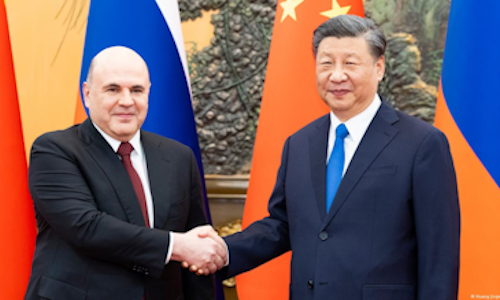
Xi told Mishustin that China and Russia would continue offering “firm support on issues concerning each other’s core interests and strengthen collaboration in multilateral arenas.”
5. China ‘Not In U.S. Ballgame’ In Middle East, Top Official Says – Middle East Eye
The U.S. is in “a different ball game” in the Middle East compared to China, a senior U.S. official said, rejecting comparisons of equal competition with Beijing in the region.
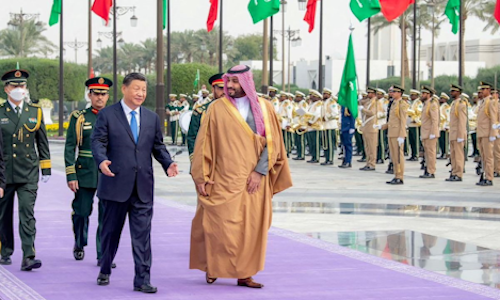
China has made recent geopolitical strides in the Middle East and is signaling the region as a priority at a time when traditional U.S. allies are concerned over Washington’s commitment to their security.
6. Russian hypersonic scientist accused of betraying secrets to China: Sources – Reuters
The director of a top Russian science institute, arrested on suspicion of treason along with two other hypersonic missile technology experts, stands accused of betraying secrets to China.
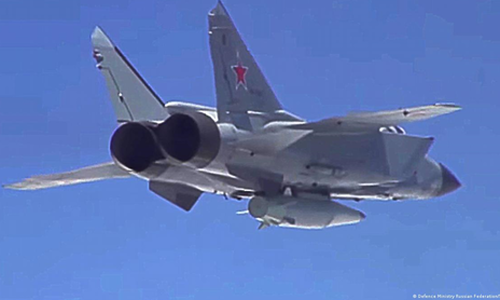
The sources said that Alexander Shiplyuk, head of Siberia’s Khristianovich Institute of Theoretical and Applied Mechanics (ITAM), is suspected of handing over classified material at a scientific conference in China in 2017.
7. Microsoft Says China-Backed Hacker Targeted “Critical Infrastructure” In U.S. – Reuters
Microsoft assessed with “moderate confidence” that the Volt Typhoon campaign “is pursuing the development of capabilities that could disrupt critical communications infrastructure between the U.S. and Asia region during future crises.”

The company said that Volt Typhoon has been active since mid-2021 and has targeted critical infrastructure organizations in Guam and elsewhere in the United States.
8. China Accuses U.S., Its Allies Of “Disinformation” Over Cyber Attack Claims – AFP
China accused the U.S. and its allies of waging a “disinformation campaign” after Washington, its Western partners, and Microsoft said state-sponsored Chinese hackers had infiltrated critical U.S. infrastructure networks.
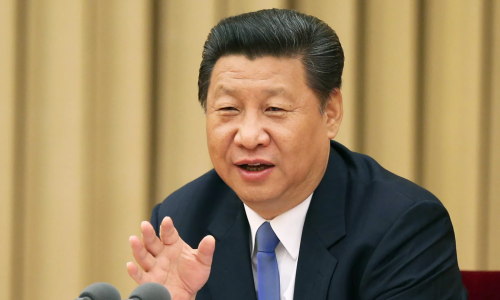
9. Norway Issues Warning To Avoid ‘Spy’ Whale Spotted Near Oslo – UPI
Norway urges people and boaters to “avoid contact” with a harness-wearing beluga whale, dubbed the “spy” whale, recently spotted in a fjord near Oslo.

Photos show the whale wearing a harness that, according to fishermen, appears to have mounts for a GoPro camera.
The harness has prompted many theories, including that the whale escaped a Russian naval base in the Murmansk region and had been “trained to spy” on Norway.
10. Iran Unveils 2,000 KM Ballistic Missile: IRNA – Reuters
Iran unveiled the 4th generation of its Khorramshahr ballistic missile under the name Khaibar with a range of 1,243 miles and a 1,500 kg warhead, the official IRNA news agency reported.

Iran has expanded its missile program, particularly its ballistic missiles, despite opposition from the United States and expressions of concern by European countries.
11. Saudi Arabia And Canada To Restore Diplomatic Ties, End 2018 Dispute – Al Arabiya
Canada and Saudi Arabia have agreed to restore full diplomatic ties and appoint new ambassadors, statements from the two countries said, ending the fallout from a 2018 dispute that damaged relations and trade.

12. Construction At North Korea’s Satellite Launch Pad Hits ‘New Urgency’: Report – WION
Satellite imagery showed that construction of a new launch pad east of the Sohae Satellite Launching Station is progressing at a “remarkable pace,” stated 38 North, a Washington-based program that monitors North Korea.
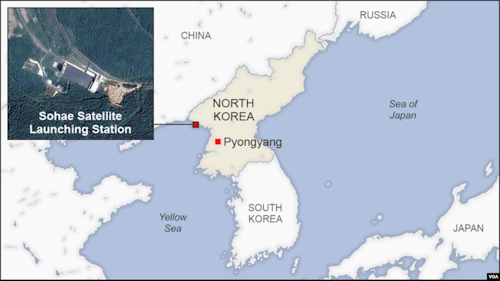
North Korea said that its first military spy satellite has been completed, and leader Kim Jong Un has approved final preparations to launch it and successfully place it in orbit without announcing a date.
13. North Korea Sanctioned Over ‘Malicious Cyber Activity’ – AFP
The U.S. government announced new sanctions on North Korean groups for what is said was the use of hackers to raise money for Pyongyang’s weapons programs.
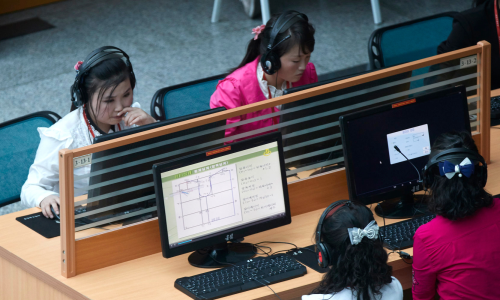
North Korea deploys thousands of tech workers abroad who engage in “malicious cyber activities that support the … government,” a U.S. Treasury Department statement said.
Please email [email protected]
Republished with permission from TIPP Insights














